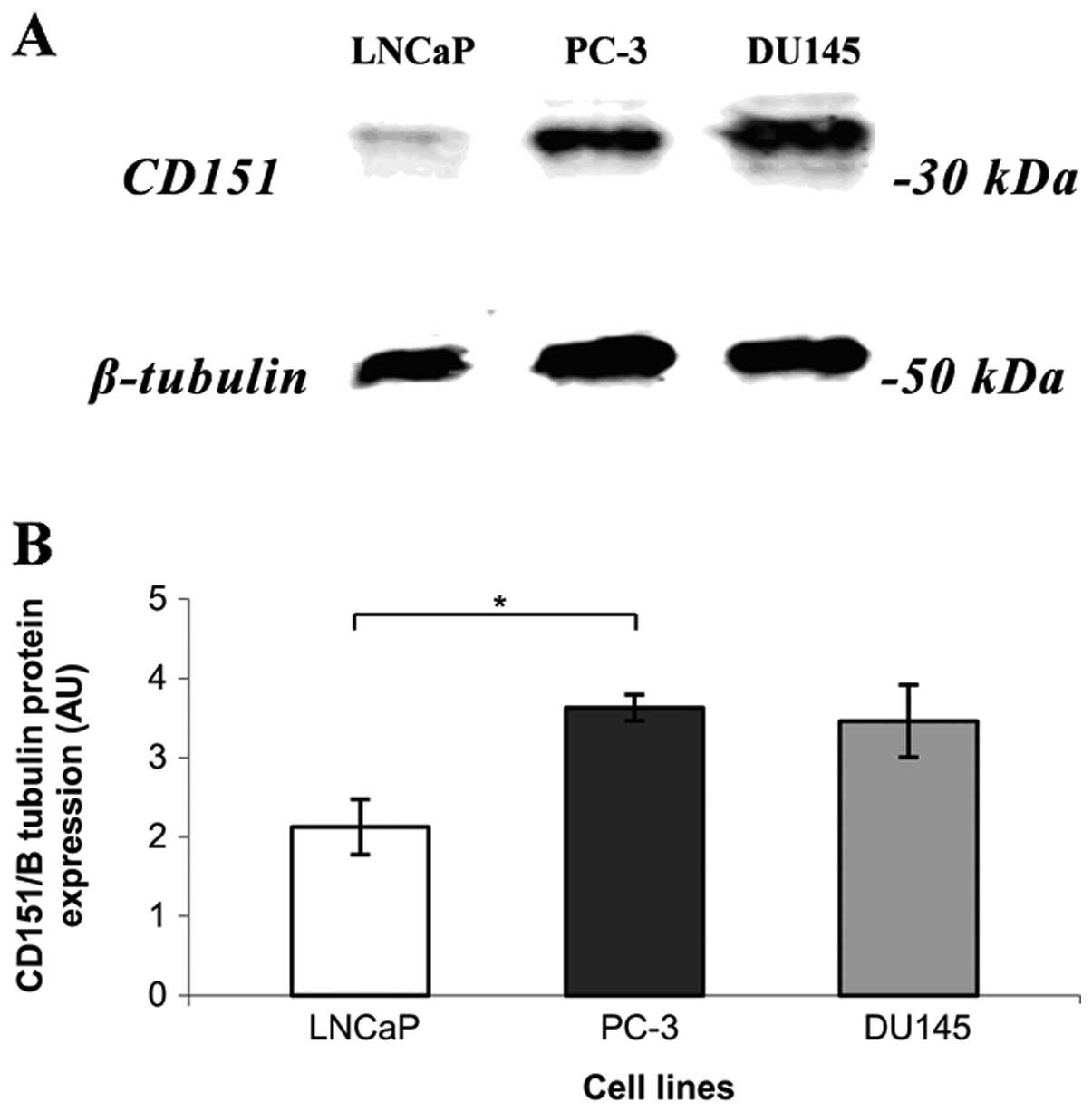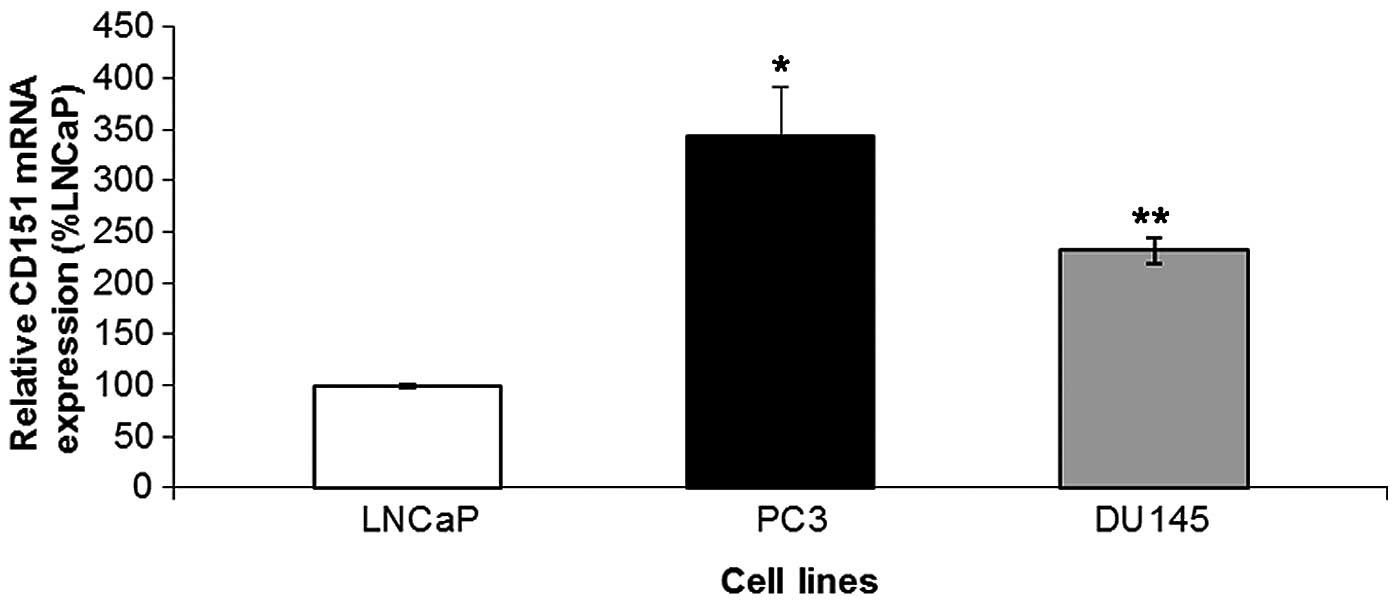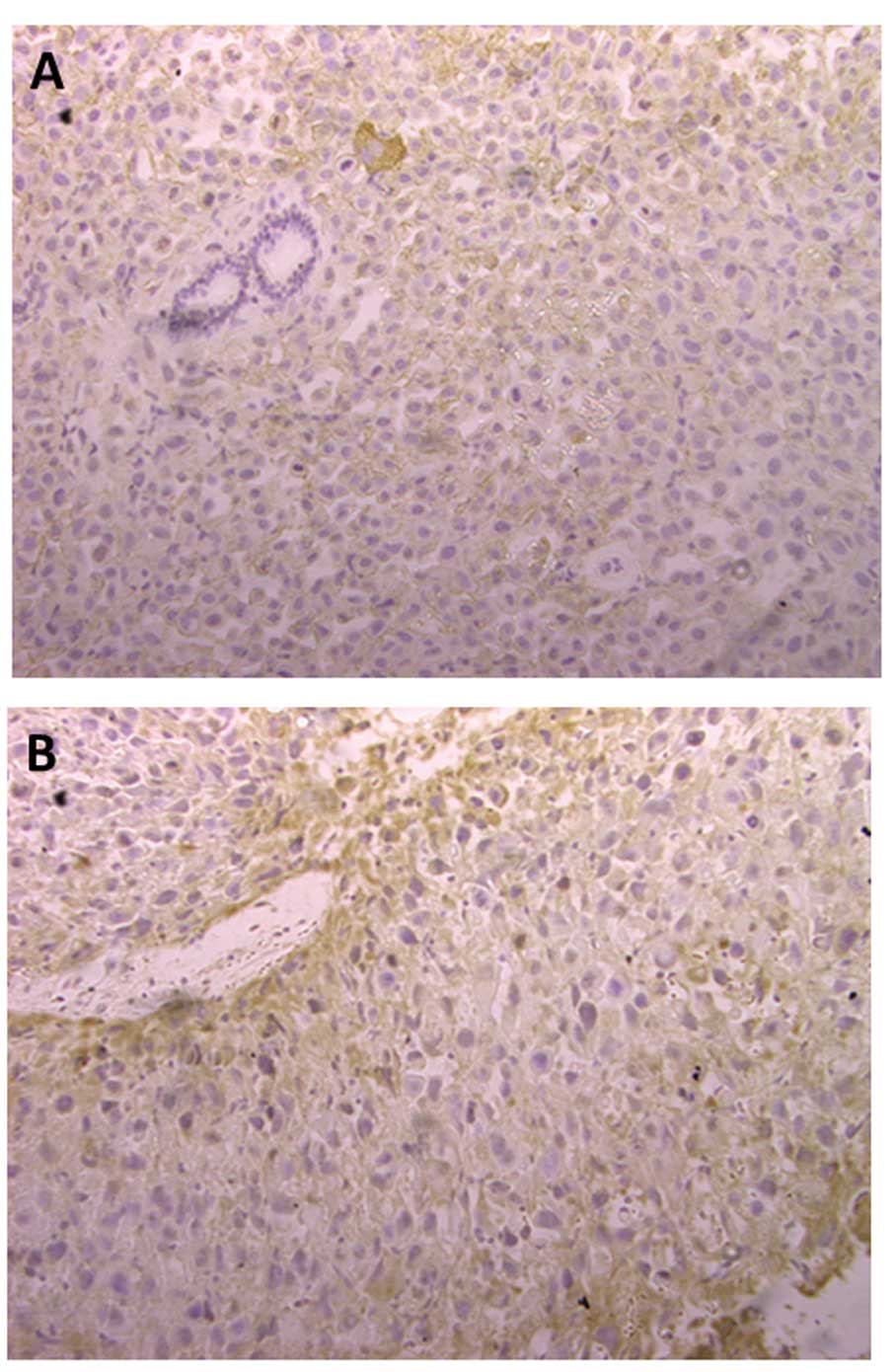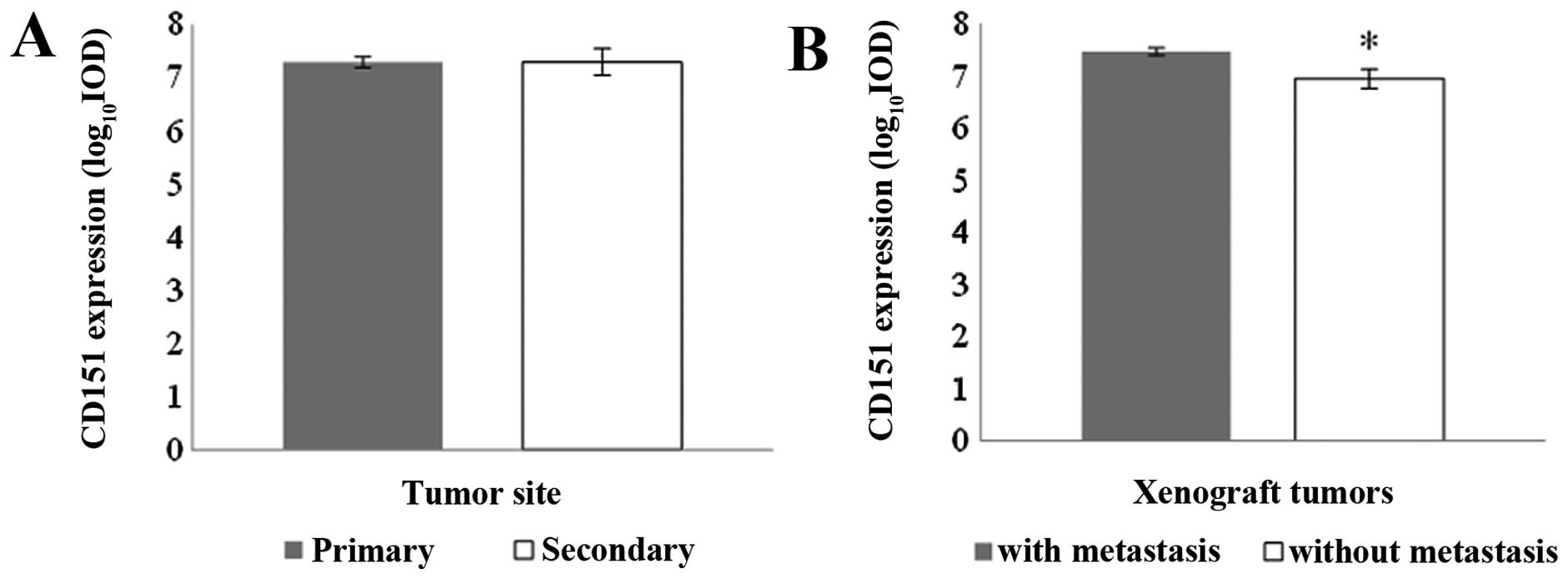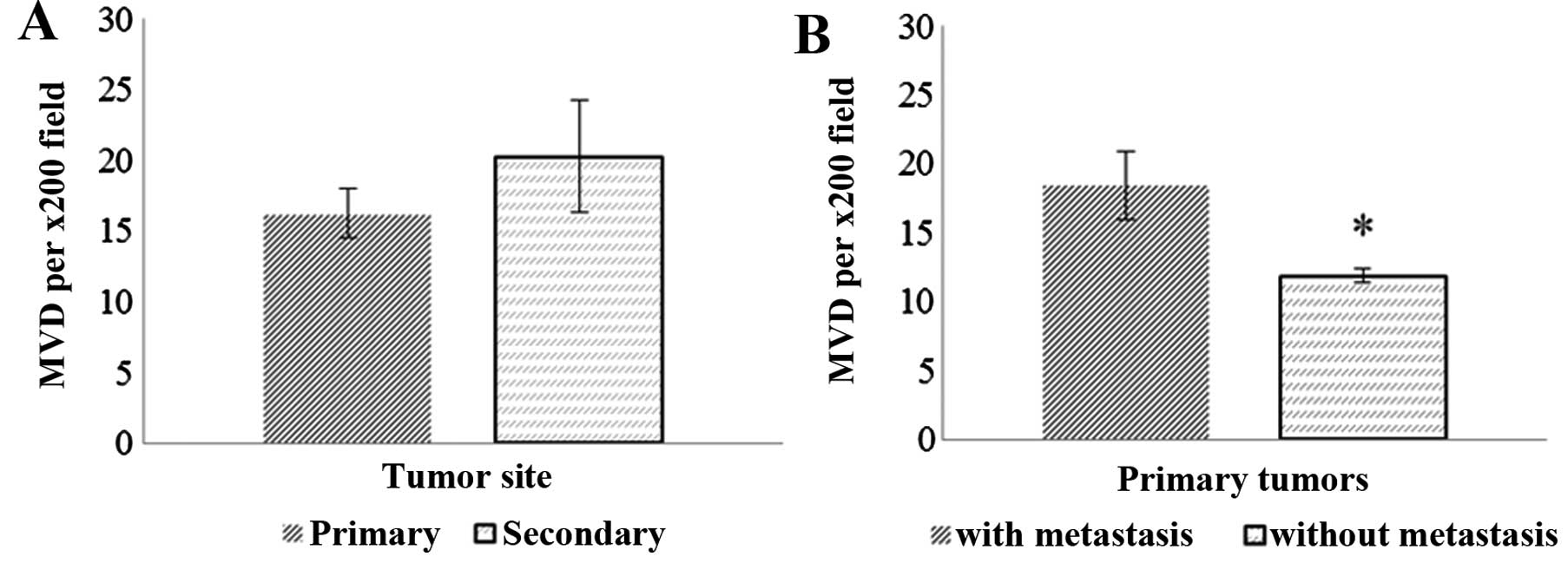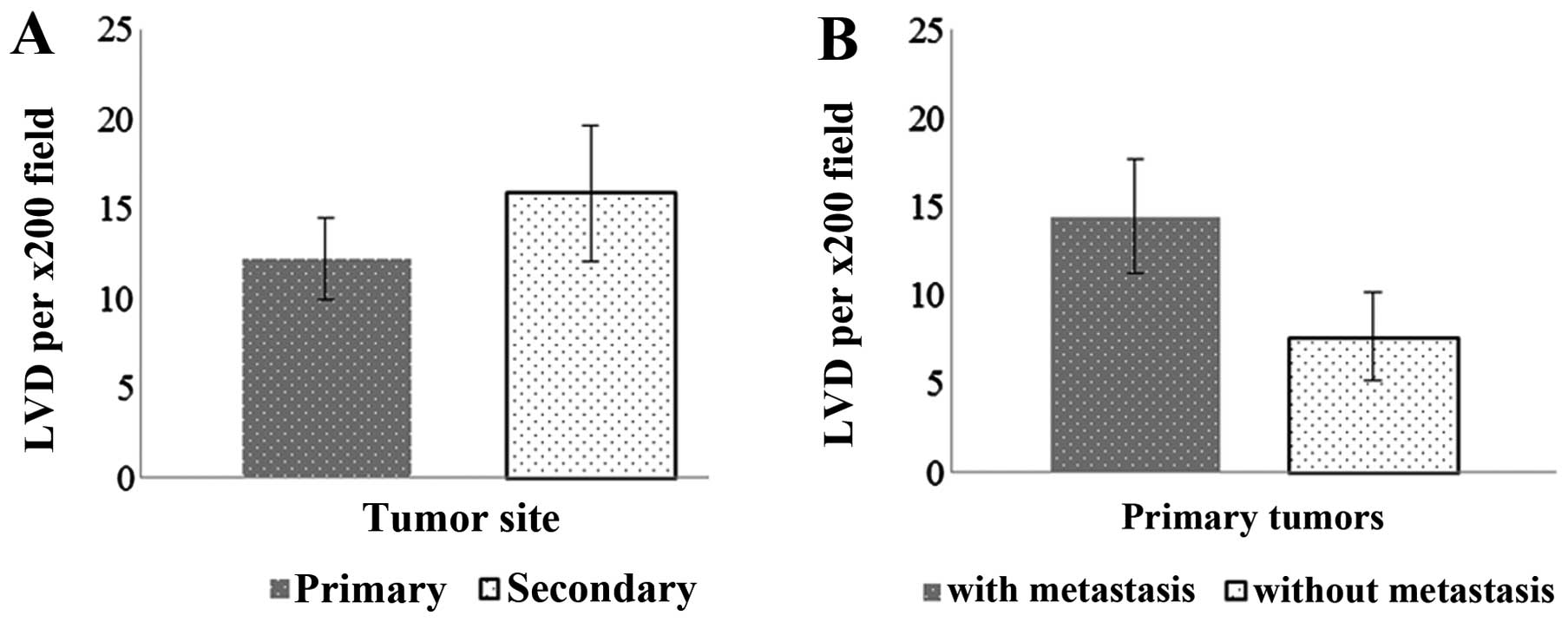|
1
|
Liu AY, Roudier MP and True LD:
Heterogeneity in primary and metastatic prostate cancer as defined
by cell surface CD profile. Am J Pathol. 165:1543–1556. 2004.
View Article : Google Scholar : PubMed/NCBI
|
|
2
|
Liu AY and True LD: Characterization of
prostate cell types by CD cell surface molecules. Am J Pathol.
160:37–43. 2002. View Article : Google Scholar : PubMed/NCBI
|
|
3
|
Liu AY: Differential expression of cell
surface molecules in prostate cancer cells. Cancer Res.
60:3429–3434. 2000.PubMed/NCBI
|
|
4
|
Hemler ME: Tetraspanin functions and
associated microdomains. Nat Rev Mol Cell Biol. 6:801–811. 2005.
View Article : Google Scholar : PubMed/NCBI
|
|
5
|
Berditchevski F: Complexes of tetraspanins
with integrins: more than meets the eye. J Cell Sci. 114:4143–4151.
2001.PubMed/NCBI
|
|
6
|
Levy S and Shoham T: Protein-protein
interactions in the tetraspanin web. Physiology. 20:218–224. 2005.
View Article : Google Scholar : PubMed/NCBI
|
|
7
|
Testa JE, Brooks PC, Lin JM and Quigley
JP: Eukaryotic expression cloning with an antimetastatic monoclonal
antibody identifies tetraspanin (PETA-3/CD151) as an effector of
human tumor cell migration and metastasis. Cancer Res.
59:3812–3820. 1999.
|
|
8
|
Longo N, Yanez-Mo M, Mittelbrunn M, et al:
Regulatory role of tetraspanin CD9 in tumor-endothelial cell
interaction during transendothelial invasion of melanoma cells.
Blood. 98:3717–3726. 2001. View Article : Google Scholar : PubMed/NCBI
|
|
9
|
Nishiuchi R, Sanzen N, Nada S, et al:
Potentiation of the ligand-binding activity of integrin α3β1 via
association with tetraspanin CD151. Proc Natl Acad Sci USA.
102:1939–1944. 2005.
|
|
10
|
Ang J, Lijovic M, Ashman LK, Kan K and
Frauman AG: CD151 protein expression predicts the clinical outcome
of low-grade primary prostate cancer better than histologic
grading: a new prognostic indicator? Cancer Epidemiol Biomarkers
Prev. 13:1717–1721. 2004.
|
|
11
|
Ang J, Fang BL, Ashman LK and Frauman AG:
The migration and invasion of human prostate cancer cell lines
involves CD151 expression. Oncol Rep. 24:1593–1597. 2010.PubMed/NCBI
|
|
12
|
Sincock PM, Mayrhofer G and Ashman LK:
Localization of the transmembrane 4 superfamily (TM4SF) member
PETA-3 (CD151) in normal human tissues: comparison with CD9, CD63
and α5β1 integrins. J Histochem Cytochem. 45:515–525.
1997.PubMed/NCBI
|
|
13
|
Geary SM, Cambareri AC, Sincock PM, Fitter
S and Ashman LK: Differential tissue expression of epitopes of the
tetraspanin CD151 recognised by monoclonal antibodies. Tissue
Antigens. 58:141–153. 2001. View Article : Google Scholar : PubMed/NCBI
|
|
14
|
Bradford MM: Rapid and sensitive method
for quantitation of microgram quantities of protein utilizing
principle of protein-dye binding. Anal Biochem. 72:248–254. 1976.
View Article : Google Scholar : PubMed/NCBI
|
|
15
|
Zeng Y, Opeskin K, Goad J and Williams ED:
Tumor-induced activation of lymphatic endothelial cells via
vascular endothelial growth factor receptor-2 is critical for
prostate cancer lymphatic metastasis. Cancer Res. 66:9566–9575.
2006. View Article : Google Scholar
|
|
16
|
Tomayko MM and Reynolds CP: Determination
of subcutaneous tumor size in a athymic (nude) mice. Cancer
Chemother Pharmacol. 24:148–154. 1989. View Article : Google Scholar : PubMed/NCBI
|
|
17
|
Mehta R, Kyshtoobayeva A, Kurosaki T, et
al: Independent association of angiogenesis index with outcome in
prostate cancer. Clin Cancer Res. 7:81–88. 2001.PubMed/NCBI
|
|
18
|
Wroel T, Mazur G, Dziegiel P, et al:
Density of intranodal lymphatics and VEGF-C expression in B-cell
lymphoma and reactive lymph nodes. Folia Histochem Cytobiol.
44:43–47. 2006.PubMed/NCBI
|
|
19
|
Weidner N, Semple JP, Welch WR and Folkman
J: Tumor angiogenesis and metastasis - correlation in invasive
breast carcinoma. N Engl J Med. 324:1–8. 1991. View Article : Google Scholar : PubMed/NCBI
|
|
20
|
Weidner N, Carroll PR, Flax J, Blumenfeld
W and Folkman J: Tumor angiogenesis correlates with metastasis in
invasive prostate carcinoma. Am J Pathol. 143:401–409.
1993.PubMed/NCBI
|
|
21
|
Weidner N: Current pathologic methods for
measuring intratumoral microvessel density within breast carcinoma
and other solid tumors. Breast Cancer Res Treat. 36:169–180. 1995.
View Article : Google Scholar : PubMed/NCBI
|
|
22
|
Quaranta V: Motility cues in the tumor
microenvironment. Differentiation. 70:590–598. 2002. View Article : Google Scholar : PubMed/NCBI
|
|
23
|
Schmelz M, Cress AE, Scott KM, et al:
Different phenotypes in human prostate cancer: α6 or α3 integrin in
cell-extracellular adhesion sites. Neoplasia. 4:243–254. 2002.
|
|
24
|
Witkowski CM, Rabinovitz I, Nagle RB,
Affinito KS and Cress AE: Characterization of integrin subunits,
cellular adhesion and tumorgenicity of 4 human prostate cell-lines.
J Cancer Res Clin Oncol. 119:637–644. 1993. View Article : Google Scholar : PubMed/NCBI
|
|
25
|
Yauch RL, Kazarov AR, Desai B, Lee RT and
Hemler ME: Direct extracellular contact between integrin
α3β1 and TM4SF protein CD151. J Biol Chem.
275:9230–9238. 2000.
|
|
26
|
Kazarov AR, Yang X, Stipp CS, Sehgal B and
Hemler ME: An extracellular site on tetraspanin CD151 determines α3
and α6 integrin-dependent cellular morphology. J Cell Biol.
158:1299–1309. 2002.PubMed/NCBI
|
|
27
|
Huss WJ, Hanrahan CF, Barrios RJ, Simons
JW and Greenberg NM: Angiogenesis and prostate cancer:
identification of a molecular progression switch. Cancer Res.
61:2736–2743. 2001.PubMed/NCBI
|
|
28
|
Steiner I, Jung K, Miller K, Stephan C and
Erbersdobler A: Expression of endothelial factors in prostate
cancer: A possible role of caveolin-1 for tumour progression. Oncol
Rep. 27:389–395. 2012.PubMed/NCBI
|
|
29
|
Gray DR, Huss WJ, Yau JM, et al:
Short-term human prostate primary xenografts: an in vivo model of
human prostate cancer vasculature and angiogenesis. Cancer Res.
64:1712–1721. 2004. View Article : Google Scholar : PubMed/NCBI
|
|
30
|
Sincock PM, Fitter S, Parton RG, Berndt
MC, Gamble JR and Ashman LK: PETA-3/CD151, a member of the
transmembrane 4 superfamily, is localised to the plasma membrane
and endocytic system of endothelial cells, associates with multiple
integrins and modulates cell function. J Cell Sci. 112:833–844.
1999.
|
|
31
|
Takeda Y, Kazarov AR, Butterfield CE, et
al: Deletion of tetraspanin CD151 results in decreased pathological
angiogenesis in vivo and in vitro. Blood. 109:1524–1532. 2007.
View Article : Google Scholar : PubMed/NCBI
|
|
32
|
Wright MD, Geary SM, Fitter S, et al:
Characterization of mice lacking the tetraspanin superfamily member
CD151. Mol Cell Biol. 24:5978–5988. 2004. View Article : Google Scholar : PubMed/NCBI
|
|
33
|
Zuo HJ, Liu ZX, Liu XC, et al: Assessment
of myocardial blood perfusion improved by CD151 in a pig myocardial
infarction model. Acta Pharmacol Sin. 30:70–77. 2009. View Article : Google Scholar : PubMed/NCBI
|
|
34
|
Lan RF, Liu ZX, Liu XC, Song YE and Wang
DW: CD151 promotes neovascularization and improves blood perfusion
in a rat hind-limb ischemia model. J Endovasc Ther. 12:469–478.
2005. View Article : Google Scholar : PubMed/NCBI
|
|
35
|
Zhang XA, Kazarov AR, Yang X, Bontrager
AL, Stipp CS and Hemler ME: Function of the tetraspanin CD151-α6β1
integrin complex during cellular morphogenesis. Mol Biol Cell.
13:1–11. 2002.
|
|
36
|
Yáñez-Mó M, Alfranca A, Cabanas C, et al:
Regulation of endothelial cell motility by complexes of tetraspan
molecules CD81/TAPA-1 and CD151/PETA-3 with α3β1 integrin localized
at endothelial lateral junctions. J Cell Biol. 141:791–804.
1998.PubMed/NCBI
|
|
37
|
Offersen BV, Borre M and Overgaard J:
Immunohistochemical determination of tumor angiogenesis measured by
the maximal microvessel density in human prostate cancer. APMIS.
106:463–469. 1998. View Article : Google Scholar
|
|
38
|
Trojan L, Thomas D, Knoll T, Grobholz R,
Alken P and Michel MS: Expression of pro-angiogenic growth factors
VEGF, EGF and bFGF and their topographical relation to
neovascularisation in prostate cancer. Urol Res. 32:97–103. 2004.
View Article : Google Scholar : PubMed/NCBI
|
|
39
|
Zhu W and Dahut WL: Tumor angiogenesis as
an early marker of long-term prostate cancer mortality. Future
Oncol. 6:341–345. 2010. View Article : Google Scholar : PubMed/NCBI
|
|
40
|
Sadej R, Romanska H, Baldwin G, et al:
CD151 regulates tumorigenesis by modulating the communication
between tumor cells and endothelium. Mol Cancer Res. 7:787–798.
2009. View Article : Google Scholar : PubMed/NCBI
|
|
41
|
Zheng ZZ and Liu ZX: CD151 gene delivery
increases eNOS activity and induces ECV304 migration, proliferation
and tube formation. Acta Pharmacol Sin. 28:66–72. 2007. View Article : Google Scholar : PubMed/NCBI
|
|
42
|
Zuo HJ, Lin JY, Liu ZY, et al: Activation
of the ERK signaling pathway is involved in CD151-induced
angiogenic effects on the formation of CD151-integrin complexes.
Acta Pharmacol Sin. 31:805–812. 2010. View Article : Google Scholar : PubMed/NCBI
|
|
43
|
Mitchell K, Svenson KB, Longmate WM, et
al: Suppression of integrin α3β1 in breast cancer cells reduces
cyclooxygenase-2 gene expression and inhibits tumorigenesis,
invasion, and cross-talk to endothelial cells. Cancer Res.
70:6359–6367. 2010.
|
|
44
|
Wang X, Ferreira AM, Shao Q, Laird DW and
Sandig M: β3 integrins facilitate matrix interactions during
transendothelial migration of PC3 prostate tumor cells. Prostate.
63:65–80. 2005.
|
|
45
|
Mitchell K, Szekeres C, Milano V, et al:
α3β1 integrin in epidermis promotes wound angiogenesis and
keratinocyte-to-endothelial-cell crosstalk through the induction of
MRP3. J Cell Sci. 122:1778–1787. 2009.
|
|
46
|
Dominguez-Jimenez C, Yanez-Mo M, Carreira
A, et al: Involvement of α3 integrin/tetraspanins complexes in the
angiogenic response induced by angiotensin II. FASEB J.
15:1457–1459. 2001.
|















